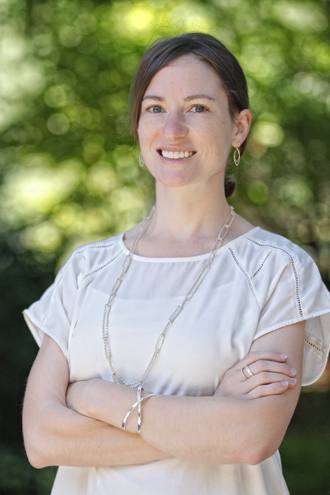Tapping into local food sources, turning off power and tuning into sustainability
 Photo/Mike Lovett
Photo/Mike LovettBrandeis Sustainability manager Mary Fischer
A multi-building competition to reduce power usage has sparked a collective energy on campus to lower kilowatt-hours and heighten awareness of sustainability efforts.
And students are participating in a month-long series of “Food Tank” discussions to explore issues around food and sustainability on campus, while more food waste is being composted than ever before.
Nine administrative and academic buildings are entering the second leg of a two-week competition to reduce electricity usage, chiefly by keeping lights off when not needed, ensuring power settings on their computers are correct, and unplugging unused devices.
“It’s still early and it’s still anyone’s game,” said campus sustainability manager Mary Fischer about the competition. “People are participating and taking this very seriously, and some buildings have appointed ‘captains’ to help urge their colleagues along in a friendly and fun way.”
So far, the nine buildings have lowered their power use by an average of 9.2 percent. Fischer expects the numbers to continue to drop as the competition enters its second week. But that doesn’t mean the campus should get complacent: Fischer is urging the community to keeps lights turned off, even those on timers, and to be mindful about plugging in devices only when necessary.
“What we’re seeing is how much of a difference turning lights off can make,” Fischer added. “We’re saving hours and hours of power, and I think staff and faculty are really taking it to heart and finding that being mindful of these issues doesn’t interrupt their productivity.”
Meanwhile, last week students met with dining officials and Sodexo chef David LaFleur to discuss sustainable alternatives to current campus food options.
“It’s important to start conversations about food and where it comes from so we’re aware of what we’re eating and its impacts,” said Jay Feinstein ’17, an environmental studies major working with Fischer on the Food Tank series.
Three more events are planned in March to discuss food production and the relationship between our diets, health, and sustainability. A food waste discussion will be preceded by a “weigh-the-waste” event at Usdan on March 8, which will make students’ average food waste visible and quantifiable to everyone eating lunch that day.
“Not only will that event show how much students are throwing away, but it will also help us determine the amount of our composted food waste coming from plates vs. scraps from food preparation,” Fischer said. “We’ve nearly tripled our composting rates in dining halls since February, thanks to combined efforts of Facilities Services, Sustainable Brandeis and Sodexo.”
The series was made possible by a $5,000 gift to Sustainable Brandeis from a donor who was inspired by stories in the Boston Globe about our rooftop farm.
“Our food choices have a major impact on the environment, though they are often invisible to us because they happen in the chain of production before they reach campus,” said Fischer. “These discussions are the first step to becoming more aware of the big picture so we can make better decisions about what we eat, and hopefully reduce what we waste.”
Categories: Alumni, General, Research, Science and Technology, Student Life





